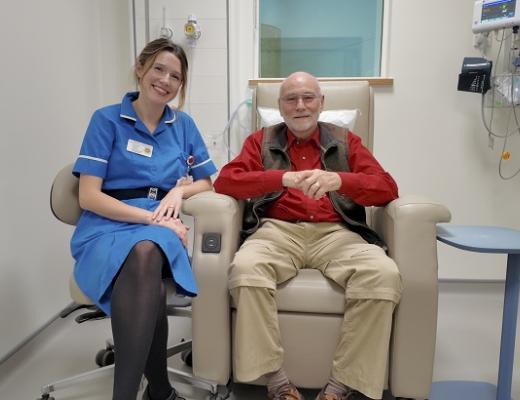Whole-body scans could better predict the chance of relapse in people with multiple myeloma
A recent study at The Royal Marsden found using whole-body MRI scans could detect remaining disease more effectively to tailor patient treatment.
What did the study find?
- Whole-body MRI scans (also known as WB-MRI) used in the study helped to show how myeloma patients had responded to treatment and could better predict whether they might relapse.
- This was possible because WB-MRI could detect tiny amounts of remaining disease in bone and soft tissue more accurately than standard blood and bone marrow tests. WB-MRI also reduces the risks of side-effects from radiation that come with regular x-rays or CT scans.
- WB-MRI could become a routine way of monitoring myeloma at The Royal Marsden, and further afield, to give patients more effective treatment and care.

What is multiple myeloma?
Multiple myeloma, also known as myeloma, is a type of bone marrow cancer. Bone marrow is the spongy tissue at the centre of some bones that produces the body's blood cells. It's called multiple myeloma as the cancer often affects several areas of the body, such as the spine, skull, pelvis and ribs.
Scanning head to toe could improve disease monitoring
Monitoring myeloma is difficult because the cancer can happen anywhere within the bone marrow.
This new study was led by The Royal Marsden in collaboration with its principal academic partner, The Institute of Cancer Research, London (ICR). The research involved 70 patients with multiple myeloma who were given WB-MRI before and after cancer treatment. A third of people in the study still showed signs of remaining disease on a WB-MRI scan, even after treatment. Results from the study showed that these patients were much more likely to relapse.
What does this mean for patients?
WB-MRI may offer a better way to monitor myeloma. Using WB-MRI could improve our understanding of how myeloma patients respond to treatment and if any traces of disease are still in the body afterwards.
Knowing more accurately whether any disease remains, even after treatment, could help to show which patients have more of a chance of relapse, so that further care can be given effectively.

“WB-MRI doesn’t involve radiation or intravenous injections, which is important for patients who may require lifelong monitoring” says Professor Christina Messiou, Consultant Radiologist at The Royal Marsden, Professor in Imaging for Personalised Oncology at The Institute of Cancer Research, London and Chief Investigator of the study.
“It’s exciting that we now have a standardised, non-invasive imaging method that can be used across cancer centres.”
WB-MRI has been adopted for certain patients at The Royal Marsden and could become a standard way of monitoring multiple myeloma patients.
Fin’s experience at The Royal Marsden
Retired Air Vice-Marshal, Fin, is Chief Fire Officer South Wales Fire and Rescue Service and a patient at The Royal Marsden. Fin was diagnosed with myeloma in 2009 during service in the Royal Air Force. Despite relapsing twice since his diagnosis, Fin’s cancer was detected much earlier using WB-MRI scans than with a traditional scan, allowing him to return to flying jets and operational duties until his retirement from the force.

He said:
“With the constant threat of relapse, myeloma patients are in a long-term mental battle with this insidious disease. However, being part of the whole-body MRI scan study at The Royal Marsden allowed my cancer to be closely watched and resulted in me being treated sooner than I would have been under normal protocols.”
The future of blood cancer treatment
As cancer imaging techniques continue to advance, WB-MRI could play a central role in how clinicians monitor myeloma and deliver more personalised cancer treatment.
The pioneering research we support at The Royal Marsden is helping patients to receive world-leading cancer treatment and care at the hospital and beyond. This exciting new study builds on The Royal Marsden’s role as a national leader in cancer imaging and blood cancer care.
The study was supported by the National Institute for Health and Care Research (NIHR) Biomedical Research Centre (BRC) at The Royal Marsden and The Institute of Cancer Research, London (ICR), The Royal Marsden Cancer Charity, and the Cancer Research UK National Cancer Imaging Translational Accelerator (NCITA).
Learn more about ways you can support pioneering research at The Royal Marsden.
Like this story?
Read more on our blog


